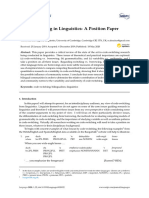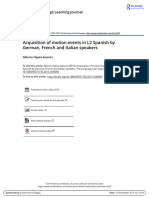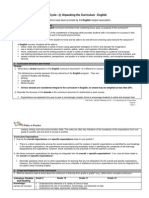01a Ccgl9038 04enginml 2017sep27
01a Ccgl9038 04enginml 2017sep27
Uploaded by
BillyCopyright:
Available Formats
01a Ccgl9038 04enginml 2017sep27
01a Ccgl9038 04enginml 2017sep27
Uploaded by
BillyOriginal Description:
Original Title
Copyright
Available Formats
Share this document
Did you find this document useful?
Is this content inappropriate?
Copyright:
Available Formats
01a Ccgl9038 04enginml 2017sep27
01a Ccgl9038 04enginml 2017sep27
Uploaded by
BillyCopyright:
Available Formats
CCGL9038
English as a global language in Asian contexts Lecture 4 English in mul<lingual contexts
The University of Hong Kong ~ Common Core Curriculum ~ Global Issues
Semester I, 2017/18
hFps://www.dropbox.com/s/F9j2od5dzoejrj/Mul<lingual
%20Hong%20Kong%20Episode%201%20-%20Present
%20Yat1%20Go3%20Project%20%282005%29.avi?dl=0
Opening
(0:00-1:00)
Discuss
with
neighbour:
How
do
you
say?
Back
to
documentary
(
~10:29)
There is a restructured variety, the result of close contact with local
languages, such as Singlish in Singapore, which is usually ocially Tradi<onal -- more structural -- deni<ons of:
disinherited, but is ocen the variety that is (a) a dominant language for
many, (b) a variety that is widely used, (c) a variety that is an important Alterna(onal code switching [=inter-senten<al]:
iden<ty marker for its speakers.
Some<mes Ill start a sentence in English y termin i Espaol.
There are plurilingual prac<ces, Some<mes Ill start a sentence in English and nish in Spanish.
which in one incarna<on are viewed as a glocalised linguis<c prac<ce in
(Poplack 1980)
which Standard English and more localised features are used in a uid mix; &
which in another incarna<on comprises a monolectal code switching prac<ce
of English and the other local language(s), e.g. Mandarin and Hokkien in Inser(onal code switching/ code mixing [=intra-senten<al]:
Singapore, or Cantonese in Hong Kong, which is a code which is used as a
intracommunal medium. Yo anduve in a state of shock pa dos dias.
(Lim 2009) I walked in a state of shock for two days.
Reading for lecture:
Lim, Lisa and Umberto Ansaldo. 2016. Languages in Contact. CUP. Chap 2.
Dr Lisa Lim, 27 Sep 2017 1
CCGL9038 English as a global language in Asian contexts Lecture 4 English in mul<lingual contexts
Markedness model of conversa<onal code-switching: Code switching as
1. a series of unmarked choices,
Speakers language choices are predictable based on a set of 2. as an exploratory choice,
indicators that are associated with each of the languages in their 3. as a marked choice, and
repertoire, 4. code switching itself as an unmarked choice.
on the assump<on that in every mul<lingual community there are
unmarked and marked language choices, (Based on research in In Nairobi, Kenya; Myers-ScoFon 1993)
where the language used is one that would be expected or
unexpected, respec<vely, in that par<cular context.
(Myers-ScoFon 1993)
Luyia passenger using Luyia to busconductor
(3) Code switching as marked choice (on a bus, Swahili would be default)
(1)
Code
switching
as
series
of
unmarked
choices
1.
L:
[Holding
out
his
hand
with
some
money
in
it,
speaking
quite
loudly,
self-consciously]
Mwana
weru,
vugula
khasimoni
khonyene.
Take
only
cy
cents,
dear
brother
A
visitor
to
a
company
and
the
security
guard
speak
ini<ally
in
Swahili,
[Other
passengers
laugh]
the
usual
language
for
such
interac<ons
between
strangers.
But
then
2.
C:
[Also
just
laughs]
the
guard,
followed
by
the
visitor,
switches
to
their
joint
ethnic
language
3.
L:
Shuli
mwana
weru
mbaa?
Luyia
when
they
discover
that
they
come
from
the
same
ethnic
group,
Arent
you
a
brother?
with
the
code
choice
indexing
their
common
iden<ty
and
marking
their
4.
C:
Apana.
Mimi
si
ndugu
wako.
Kama
ungekuwa
ndugu
wangu
ningekujua,
ningekujua
kwa
rela<onship
as
one
between
ethnic
brethren
rather
than
strangers.
jina.
Lakini
sasa
sikujui
wala
sikufahamu.
No,
Im
not
your
brother.
If
you
were
my
brother,
I
would
know
you.
I
would
know
you
by
name.
But
now
I
dont
know
you
nor
do
I
understand
you.
5.
L:
Nisaidie,
tu,
Bwana.
Maisha
ya
Nairobi
imenishinda
kwa
sababu
bei
ya
kila
kitu
(2)
Code
switching
as
an
exploratory
choice
imeongezwa.
Mimi
ninakeM
Kariobangi,
pahali
ninapolipa
pesa
nyingi
sana
kwa
nauli
ya
basi.
A
local
businessman
meets
up
with
a
former
classmate,
now
a
university
Just
help
me,
mister.
The
life
of
Nairobi
has
defeated
me
because
the
price
of
student
who
is
home
for
a
visit.
Uncertain
how
to
relate
to
his
former
everything
has
gone
up.
I
live
in
Kariobangi,
a
place
to
which
I
pay
much
money
for
the
classmate,
he
tries
English,
a
marked
choice
to
be
used
in
a
local
bar,
as
bus
fare.
well
as
some
Kikuyu
and
Swahili,
either
or
both
of
which
could
be
the
6.
C:
[Taking
some
money
out
of
the
Luyia
mans
outstretched
hand]
unmarked
choice.
He
ends
up
using
English
inappropriately
and
more
Nimechukua
peni
nane
pekee
yake.
frequently
than
his
former
classmate
who,
as
a
university
student,
I
have
taken
80
cents
alone.
would
actually
have
more
familiarity
with
the
language.
7.
L:
Thank
you
very
much.
Nimeshkuru
sana
kwa
huruma
ya
ngugu
wangu.
Thank
you
very
much
for
the
pity
of
this
one,
my
brother.
Dr Lisa Lim, 27 Sep 2017 2
CCGL9038 English as a global language in Asian contexts Lecture 4 English in mul<lingual contexts
(4)
Code
switching
as
unmarked
choice
Taita
&
Luyia
speakers
in
Nairobi,
Kenya,
using
Swahili
and
English
T:
Ukisha
ikanyaganganga
hivi
pedals,
unasikia
air
umeshakishwa.
Sasa
unashangaa
kama
ni
bike
au
ni
ma-ghosts.
When
you
step
on
the
pedals
you
hear
the
air
coming
out.
Now
you
wonder
whether
its
the
bike
or
the
ghosts
[that
do
that].
monolectal
code
switching
(Meeuwis
and
Blommaert
1998)
on
Lingala-French
code
used
by
Zaireans
in
Belgium
L:
Wewe
pia
una-believe
habari
ya
ma-ghosts
kumbe?
You
also
believe
about
ghosts?
fused
lect
(Auer
1999):
to
denote
a
combina<on
of
structures
from
T:
Ah,
ghost,
lazima
una-believe,
usiku
unaona
something
kama
bones
na
dierent
language
sources
which
no
longer
has
any
par<cular
inatembea
on
the
road.
conversa<on-structuring
func<on,
but
instead
is
meaningful
as
a
Ah,
ghost,
you
have
to
believe
[when]
at
night
you
see
something
like
bones
wholesale
token
of
group
iden<ty
and
mode
of
conversa<on
and
its
walking
on
the
road.
It
is
this
last
paFern
of
unmarked
code
switching
that
is
perhaps
L:
Kulikuwa
na
table
long
namna
hii,
maze,
imejaa
tu
chakula
ya
kila
aina
most
signicant
in
mul<lingual
communi<es.
This
is
when
language
Nilikwenda
pale
nikaangalia,
nikapata
chakula
nyingine
iko
grey,
nika-i-taste
alterna(on
itself
cons<tutes
a
default
op<on
that
is
meaningful
as
a
nikaona
ina
taste
lousy
sana.
signal
of
shared,
mul<lingual
iden<ty.
(Lim
and
Ansaldo
2016)
There
was
a
long
table
like
this,
my
friend,
full
of
food
of
every
kind
I
went
there
and
looked
and
I
got
another
kind
of
food
[that
was]
grey,
and
I
tasted
it
and
I
thought
it
had
a
very
lousy
taste.
Mixed code as the usual, dis(nc(ve linguis(c mode
Mixed code of English and Cantonese in 2nd-genera<on bilinguals, e.g.
1. Prociency in languages is not conceptualised individually, with younger genera<on Bri<sh-born Chinese, in north England, originally
separate competencies developed for each language. What is from Ap Chau, HK (Li Wei 1998)
emphasised is the repertoire the way the dierent languages
cons<tute an integrated competence.
2. Equal or advanced prociency is not expected in all the languages. A: Yeo hou do yeo contact
3. Using dierent languages for dis<nct purposes qualies as Have very many have contact
competence. One does not have to use all the languages involved as We have many contacts
all-purpose languages.
4. Language competence is not treated in isola<on but as a form of social G: We always have opportuni<es heu xig kei ta dei fong gaowui di
prac<ce and intercultural competence. yen. Ngodei xixi dou keep in contact
5. There is a recogni<on that speakers develop plurilingual competence We always have opportuni<es to get to know people from other
by themselves (intui<vely and through social prac<ce) more than churches. We always keep in contact.
through schools or formal means.
Dr Lisa Lim, 27 Sep 2017 3
CCGL9038 English as a global language in Asian contexts Lecture 4 English in mul<lingual contexts
Mixed
code
as
the
usual,
dis(nc(ve
linguis(c
mode
Mixed
code
as
the
usual,
dis(nc(ve
linguis(c
mode
(contd)
(contd)
Taglish
is
the
usual
code
amongst
(urban)
Filipinos,
with
pure
Tagalog
English,
Mandarin
and
Hokkien
used
by
Chinese
Singaporeans
(Tay
or
English
seldom
heard
(Bau<sta
and
Gonzales
2009;
McFarland
2009)
1993;
Lim
2009)
Then
they
ask
me,
ano
pa
daw
capabili<es
ko
in
singing
I
did
not
told
Oh
I
see,
guai
bu
de
wo
xie
xing
wen
bi
jiao
kuai,
gua
sia
eng
boon
them
gusto
ko
sila
mag
nd
out.
luan
jut
u
luan
ju
sia,
jiaru
move
de
fast,
bo
tek
khak
o.
Dui
bu
qi.
I
got
Then
they
ask
me,
what
other
capabili<es
I
have
in
singing
I
did
not
to
go.
tell
them
I
wanted
them
to
nd
out
for
themselves
Oh,
I
see,
no
wonder
I
write
faster
in
English,
when
I
write
English,
I
simply
scribble
and
write,
carelessly,
if
[I]
move
fast,
[Im]
not
sure.
Sorry.
I
got
to
go.
Plurilingual English (here: Englishised Tamil)
as unmarked everyday code also in formal domains
Senior Professor and junior Lecturer in Jana, Sri Lanka speaking in
Englishised Tamil (English and Tamil)
An increasing body of research is
1 P: So you have done a masters in sociology? What is your area of
research?
i. rst, documen<ng the presence of such prac<ces in the
2 L: Naan sociology of religion-ilai taan interested. enTai thesis topic classroom, revealing that it is not only prac<sed by students
vantu the rise of local dei<es in the Jana peninsula. amongst themselves, whether in or out of structured lesson <me,
It is in the sociology of religion that I am interested. My thesis topic
was the rise of local dei<es in the Jana peninsula. but also by teachers in lessons, and,
ii. further, demonstra<ng that such prac<ces are systema<c and
3 P: Did this involve a eld work? serve pedagogical purposes.
(Lim and Ansaldo 2016)
4 L: oom, oru ethnographic study-aai taan itay ceitanaan. kiTTaDaTTa
four years-aai eld work ceitanaan.
Yes, I did this as an ethnographic study. I did eld work for roughly
four years.
5 P: appa kooTa qualita<ve research taan ceiyiraniir?
So you do mostly qualita<ve research?
Dr Lisa Lim, 27 Sep 2017 4
CCGL9038 English as a global language in Asian contexts Lecture 4 English in mul<lingual contexts
Singapore
classroom
language
use:
Singapore
classroom
teacher
talk:
Using
globalist
(standard)
Students
use
Standard
English,
Singlish
and
Mandarin
features
when
organising
the
lesson,
alongside
localist
features
organising
rather
than
obstruc(ng
learning
when
focusing
on
content
1
TJ:
Number
3,
A
girl
is
siwng
on
a
swing
hao
le
ma?
So
you
can
do
things
like
this
ok
...
[Long
pause]
Ya,
I
dont
want
to
keep
are
you
done?
men<oning
your
name
here.
Ya,
Go
blush.
Ok,
structure.
This
is
about
the
2
JG:
hei,
ni
kan
ni
same
structure
as
we
did
for
ac<on
story.
Recap,
you
are
going
to
be
given
hey,
look
at
what
you
did
a
template
later.
A
template
will
be
given;
I
am
not
going
to
reprint
the
3
TJ:
hao
le
ma?
template.
This
template
is
given
to
you
as
a
model
and
this
template,
youll
are
you
done?
be
using
for
all
your
work
from
now
on
from
all
the
other
passage
Ill
be
4
JG:
deng
yi
xia
lah
wo
deng
yi
xia
lah,
ni
chao
si
ren
giving,
for
all
the
wri<ng
that
you
are
going
to
do,
for
even
the
produc<on
wait
a
moment
I
wait
a
moment
you
are
too
noisy
that
you
are
coming.
What
is
our
end
result
of
this
produc<on
here,
ya,
5
TJ:
ni
ye
shi
hen
chao
leh
you
are
noisy
too
Ian?
That
means
our
end
result
in
two,
three
weeks
<me,
instead
of
6
JG:
wo
duo
mei
you
chao
ni,
ni
chao
wo,
hao
liao
coming
up
with
a
commercial
you
will
be
given
a
choice
to
come
up
with
a
I
didnt
disturb
you,
you
disturb
me,
its
done
produc<on
of
your
suspense
story.
Ya,
but
this
<me
it
need
not
be;
[
]
you
[]
want
to
act
it
out,
[
]
you
want
to
lm
it,
lm
it,
[
]
you
want
to
make
an
21
TJ:
Number
8,
a
girl
is
ska<ng
audio
tape
out
of
it,
make
an
audio
tape
out
of
it,
[
]you
want
to
write
it,
22
JG:
A
boy
lah
ni
(you)
(Silver
and
Bokhorst-Heng
2013)
script
it,
go
ahead.[
]
You
want
to
make
a
comic
script
out
of
it,
go
ahead,
but
we
will
lead
on
to
it
and
well
show
you
dierent
types,
ok.
In Sri Lankan classroom: Teachers and students use diverse
languages to nego(ate content and facilitate language acquisi(on
Scaold () always ah, in any wri<ng. You it, eh, Band B, you need to
know all this, you know, because when we mark [ ] ah, well check ah.
Intro, that one, you all know ah, introduc<on, how you start. Very 1 T: Today we are going to study about fruits. What fruits do you
usually eat? ( ) inraikku niinkal viiTTilai enna palankaL caappiTTa
important, when I pick up a story, the rst thing that does is the intro. [ ]
niinkaL? Cila peer kaalamai caappaaTTikku paLankaL
You go and buy a story book, the intro doesnt always start, long Mme caappiTiravai ello?
ago, once upon a Mme, far, far away in a long lost land ter ra ra ra. Dont What fruits did you eat this morning at home? Dont some
have. Theme? What theme? Although its a suspense story, but what you people eat fruits for breakfast?
doing, which theme are you going about? (Announcement on
loudspeaker). Eh, 4G. Ok, the, whatever theme you set, the sewng must 2 S1: naan maampaLam caappiTTanaan, Miss.
match ok. If you want to do a theme of ok, maybe eh, where there are I ate mangoes, Miss.
knights and castles or whatever [ ] ok, Peters favourite, then the sewng
must be there. You want to talk about the pirates and everything at that 3 T: Good, mangoes, eh? Maampalam enRaal mangoes.
Maampalam means mangoes.
<me, then the sewng must be there. You want to talk about eh say the,
what we did, we watch the roller coasters and its about a fair and the 4 S2: vaaLappaLam caappi[a naan, Miss.
modern <mes, then the sewng must be there. I ate bananas, Miss.
(Kwek 2005, in Alsago 2010) 5 T: Okay, bananas. (Canagarajah 2009)
Dr Lisa Lim, 27 Sep 2017 5
You might also like
- Gottlieb-Subtitling A New University DisciplineDocument10 pagesGottlieb-Subtitling A New University DisciplineAgil backup100% (4)
- HermanYeung DSE Econ All-In-One Note NewDocument96 pagesHermanYeung DSE Econ All-In-One Note NewBilly0% (1)
- Luganda Phonology ChapterDocument41 pagesLuganda Phonology Chaptermr.pidatoNo ratings yet
- The Discursive and Pragmatic Effects of Code-SwitchingDocument44 pagesThe Discursive and Pragmatic Effects of Code-SwitchingMayMay Serpajuan-SablanNo ratings yet
- Determiner-Noun Code-Switching in Spanish Heritage SpeakersDocument12 pagesDeterminer-Noun Code-Switching in Spanish Heritage SpeakersGabriel RodríguezNo ratings yet
- Code Switching and Code MixingDocument25 pagesCode Switching and Code Mixinganna39No ratings yet
- Code Switching and Code MixingDocument25 pagesCode Switching and Code MixingIfah AaifahNo ratings yet
- Who Speaks English Today?Document23 pagesWho Speaks English Today?phuongthao07052002No ratings yet
- English AyapanencoDocument32 pagesEnglish AyapanencoperonNo ratings yet
- Languages 05 00022 v2Document19 pagesLanguages 05 00022 v2janelaNo ratings yet
- Hausarbeit Anglistik Features of Bilingual Speech Interference Borrowing Code Switching Eng Axh0040Document15 pagesHausarbeit Anglistik Features of Bilingual Speech Interference Borrowing Code Switching Eng Axh0040nazim iabedNo ratings yet
- Research On Audiovisual TranslationDocument23 pagesResearch On Audiovisual TranslationFabricio GorositoNo ratings yet
- Is Translation All You Need? A Study On Solving Multilingual Tasks With Large Language ModelsDocument19 pagesIs Translation All You Need? A Study On Solving Multilingual Tasks With Large Language ModelsBrendaNo ratings yet
- Language ChoiceDocument34 pagesLanguage Choicejc asistinNo ratings yet
- Language Contact and Code-SwitchingDocument9 pagesLanguage Contact and Code-SwitchingAgus KaiserNo ratings yet
- Language Contact and Its OutcomesDocument33 pagesLanguage Contact and Its OutcomesWinterMae BacalsoNo ratings yet
- Spanish-English2 Code SwitchingDocument9 pagesSpanish-English2 Code Switchingmajid mirzaeeNo ratings yet
- Consecutive and Simultaneous TranslationDocument5 pagesConsecutive and Simultaneous TranslationRaman 98980% (1)
- Use ThisDocument31 pagesUse ThisJontonyNo ratings yet
- Contribution 1337 Final ADocument6 pagesContribution 1337 Final Aneyazimuhammad14No ratings yet
- ENG 4120 - Unit3Document25 pagesENG 4120 - Unit3fanrNo ratings yet
- Atikah Safirah-The Use of Code-SwitchingDocument43 pagesAtikah Safirah-The Use of Code-SwitchingAtikah SafirahNo ratings yet
- Code SwitchingDocument5 pagesCode SwitchingAriska Yuli0% (1)
- Metrolingualism - Language in The City1Document7 pagesMetrolingualism - Language in The City1vlthuy0211No ratings yet
- Bilingualism Paper - Monica PuscasuDocument5 pagesBilingualism Paper - Monica PuscasuMonica PuscasuNo ratings yet
- Inference Shift XdyDocument11 pagesInference Shift Xdyhengyuan zhangNo ratings yet
- Dealing With Difference in Audiovisual Translation - Subtitling Linguistic Variation in FilmsDocument231 pagesDealing With Difference in Audiovisual Translation - Subtitling Linguistic Variation in FilmsIrina FloareaNo ratings yet
- Code Switching and Code MixingDocument12 pagesCode Switching and Code Mixingnidal13346No ratings yet
- CLIL Methodology II - Unit 3 & Unit 4 - Practice TaskDocument10 pagesCLIL Methodology II - Unit 3 & Unit 4 - Practice Taskpablo cavestanyNo ratings yet
- Summary of Chapter11Document2 pagesSummary of Chapter11detektifconnyNo ratings yet
- Bao 2009 OneDocument29 pagesBao 2009 OneSean LowNo ratings yet
- Is ELF A Variety of English?: Luke ProdromouDocument7 pagesIs ELF A Variety of English?: Luke ProdromouEleni MoschouNo ratings yet
- Mixture of Varieties: Karbala UniversityDocument20 pagesMixture of Varieties: Karbala Universityنوفل السعديNo ratings yet
- Attentional Control in Interpreting A Model of Language Control and Processing ControlDocument13 pagesAttentional Control in Interpreting A Model of Language Control and Processing Controlntemirova.tsuullNo ratings yet
- Class 1Document6 pagesClass 1Nico NidaNo ratings yet
- MC Arthur "Worldwide Communication CentresDocument28 pagesMC Arthur "Worldwide Communication CentresMa. Rhodora S. Ma. NievaNo ratings yet
- UnitplanDocument4 pagesUnitplanapi-349656067No ratings yet
- Traducción Inglés-EspañolDocument6 pagesTraducción Inglés-EspañolLaura BznNo ratings yet
- A Spanish Speech To Sign Language Translation SystDocument5 pagesA Spanish Speech To Sign Language Translation SystAnca DragoiNo ratings yet
- Lingtera,: Code-Switching and Code-Mixing in English Learning ProcessDocument10 pagesLingtera,: Code-Switching and Code-Mixing in English Learning ProcessSafira SumagaNo ratings yet
- 08 - Can You Speak English - Lesson Notes LiteDocument4 pages08 - Can You Speak English - Lesson Notes LitetonyNo ratings yet
- General Criteria For Subtitling - Technical AspectsDocument4 pagesGeneral Criteria For Subtitling - Technical AspectsTheFireRedNo ratings yet
- B.E DDocument2 pagesB.E DRor saabNo ratings yet
- Group 6 - Translanguaging (Key Issues)Document22 pagesGroup 6 - Translanguaging (Key Issues)Ice PrincessNo ratings yet
- Translating Similar Languages: Role of Mutual Intelligibility in Multilingual TransformersDocument7 pagesTranslating Similar Languages: Role of Mutual Intelligibility in Multilingual Transformerschibundum.adebayoNo ratings yet
- Ludi Py PlurilingualspeakerDocument15 pagesLudi Py PlurilingualspeakercarogandulfoNo ratings yet
- 2020-ACL-From English To Code-Switching - Transfer Learning With Strong Morphological CluesDocument12 pages2020-ACL-From English To Code-Switching - Transfer Learning With Strong Morphological Cluesheyq1314No ratings yet
- Hijazo-Gascón 2015Document27 pagesHijazo-Gascón 2015Gaby ColomboNo ratings yet
- Language Contact and Contact LanguagesDocument17 pagesLanguage Contact and Contact LanguagesAhmed RajjNo ratings yet
- Code Switching in EFL ClassroomDocument7 pagesCode Switching in EFL ClassroomFajarAminullahNo ratings yet
- Chapter IiDocument19 pagesChapter IiAzhari AzhariNo ratings yet
- 3.1. Paquet and Beulieu 2016 Can Language Classrooms Take The Multilingual TurnDocument18 pages3.1. Paquet and Beulieu 2016 Can Language Classrooms Take The Multilingual TurnAlejandroNo ratings yet
- Ahn Et Al. - 2020 - Minimal Overlap in Language Control Across ProductDocument22 pagesAhn Et Al. - 2020 - Minimal Overlap in Language Control Across ProductAleksa PetkovićNo ratings yet
- 4 Bi EnglishDocument9 pages4 Bi EnglishAntonina KumkaNo ratings yet
- Code Switching and Code MixingDocument9 pagesCode Switching and Code Mixingsekar ratih100% (1)
- Methodology in English Language TeachingDocument27 pagesMethodology in English Language TeachingLana ReyNo ratings yet
- Teaching CognatesDocument167 pagesTeaching CognatesFlavia Cagnin100% (1)
- Code SwitchingDocument16 pagesCode SwitchingAmy Cacho0% (1)
- Avanzado 1 Unit 1Document17 pagesAvanzado 1 Unit 1José Alberto Luis EstévezNo ratings yet
- Week 6: Introduction To Natural Language ProcessingDocument18 pagesWeek 6: Introduction To Natural Language ProcessingDimpu ShahNo ratings yet
- Tutorial 2Document2 pagesTutorial 2BillyNo ratings yet
- ELEC 2441 - Computer Organization and MicroprocessorsDocument18 pagesELEC 2441 - Computer Organization and MicroprocessorsBillyNo ratings yet
- 01A CCGL9038 03StdsNativen2017Document9 pages01A CCGL9038 03StdsNativen2017BillyNo ratings yet
- ELEC 2441 - Computer Organization and MicroprocessorsDocument43 pagesELEC 2441 - Computer Organization and MicroprocessorsBillyNo ratings yet
- 01 Giddens 2004 The Future of World Society - The New Terrorism. Lecture Delivered at The London School of Economics, November 10, 2004Document10 pages01 Giddens 2004 The Future of World Society - The New Terrorism. Lecture Delivered at The London School of Economics, November 10, 2004BillyNo ratings yet
- The Jury by WR CornishDocument139 pagesThe Jury by WR CornishBillyNo ratings yet
- Flexner and Medical EducationDocument18 pagesFlexner and Medical EducationalexvijaNo ratings yet
- Testing Team and Development TeamDocument33 pagesTesting Team and Development TeamAryaman Singh100% (1)
- Detailed Lesson Plan in English ViDocument8 pagesDetailed Lesson Plan in English ViRonna Mae SaymanNo ratings yet
- Correlates of Attachment at Age 3. Construct Validity of The Preschool Attachment Classification SystemDocument12 pagesCorrelates of Attachment at Age 3. Construct Validity of The Preschool Attachment Classification SystemEduardo Aguirre DávilaNo ratings yet
- Seismic: VvinuDocument528 pagesSeismic: VvinuLucas ScartonNo ratings yet
- On BrentanoDocument99 pagesOn BrentanoAnonymous LnTsz7cp100% (1)
- 20090309375945770490Document16 pages20090309375945770490kuangte0No ratings yet
- Akash Khandagale JavaDeveloper Resume PDFDocument2 pagesAkash Khandagale JavaDeveloper Resume PDFvidhiNo ratings yet
- REPORTING - Step-2 - Identifying-StakeholdersDocument19 pagesREPORTING - Step-2 - Identifying-StakeholdersMia S. RetomeNo ratings yet
- Content Analysis The Economic Impact of Area F To Private SchoolsDocument10 pagesContent Analysis The Economic Impact of Area F To Private SchoolsMartin Ceazar HermocillaNo ratings yet
- Survey QuestionnaireDocument3 pagesSurvey QuestionnaireChristian PalmosNo ratings yet
- Implementation of School Learning Continuity Plan in The Light of New Normal in Public Elementary Schools in Morong Sub-OfficeDocument9 pagesImplementation of School Learning Continuity Plan in The Light of New Normal in Public Elementary Schools in Morong Sub-OfficePsychology and Education: A Multidisciplinary JournalNo ratings yet
- Teaching_Pronunciation_A_Reference_for_TDocument8 pagesTeaching_Pronunciation_A_Reference_for_Ttu anh caoNo ratings yet
- Intro To AI Course Outline Spring2021-SG-V2.0Document2 pagesIntro To AI Course Outline Spring2021-SG-V2.0Sarim KhanNo ratings yet
- RDC Prospectus 2017Document8 pagesRDC Prospectus 2017Tirupathi Rao TellaputtaNo ratings yet
- If-Then Adventure Stories Lesson PlanDocument11 pagesIf-Then Adventure Stories Lesson Planapi-431136400No ratings yet
- Example of A Literature Review Social WorkDocument4 pagesExample of A Literature Review Social Workafmzrxbdfadmdq100% (1)
- PROS12Document155 pagesPROS12Sammi KashyapNo ratings yet
- ApplecasestudyDocument14 pagesApplecasestudyWarm PrinceNo ratings yet
- Course Rubrics - PharmacologyDocument3 pagesCourse Rubrics - PharmacologyKenneth NuñezNo ratings yet
- CEH v5 Module 00 Student IntroductionDocument19 pagesCEH v5 Module 00 Student IntroductionDennis Quispe PuchocNo ratings yet
- Week 1Document16 pagesWeek 1Bryan SmileNo ratings yet
- Essay On GandhijiDocument7 pagesEssay On Gandhijiyeuroqaeg100% (2)
- Historical ThinkingDocument17 pagesHistorical ThinkingMelih ShamanNo ratings yet
- Web Developer Khanh VanDocument3 pagesWeb Developer Khanh VanNguyễn Đại TrưởngNo ratings yet
- Jmias 69 Al ShathyatDocument137 pagesJmias 69 Al ShathyatHind RifaiNo ratings yet
- OT Believers Indwelt-McCabeDocument50 pagesOT Believers Indwelt-McCabetomcdavis4001No ratings yet
- Aishwarya Srivastava ResumeDocument1 pageAishwarya Srivastava ResumeAnonymous yJueu0uClJNo ratings yet
- Six Thinking HatsDocument11 pagesSix Thinking Hatsssg7111No ratings yet
- DK Workbooks Geography Grade 3Document62 pagesDK Workbooks Geography Grade 3Raluca Pop100% (3)
































































































